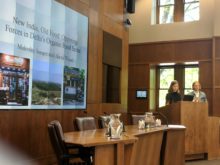On September 28, 2017, students from the Asian Institute presented the results of their year-long research projects in a conference titled “Internationalization in Action: Transformative Student Research at the Asian Institute”. Presentations showcased research conducted for the Richard Charles Lee Insights through Asia Challenge (ITAC) as well as the “Asian Pathways Research Practice” (CAS450H) capstone seminar and the Global Taiwan Studies’ Big Ideas competition.
Postdoctoral Fellow Emily Hertzman introduced ITAC, a program she works with closely as an academic mentor. Hertzman outlined ITAC’s emphasis on the application of academic studies to real world challenges in addition to collaborative problem-solving and deepening understandings of our place in the world.
An annual interdisciplinary competition, ITAC awards funding and support to selected student applicants. ITAC facilitates student field research in Asia and the production of this research as an academic deliverable. This year’s research ranged from India to Thailand to Toronto; public health to university enrollment. Students output this research in a variety of forms. For example, two teams are currently producing documentary films, focusing on digital technology in Shanghai and food culture in Delhi, respectively.
Reflecting on the conference, Hertzman states, “The students gave effective synopses of the original research they conducted overseas this summer. They honed in on their projects’ exact issues of relevance, allowing us to get a sense of their data analysis process.”
Following the ITAC presentation, Professor Lynette Ong introduced the work of her CAS450 undergraduate students. As the capstone seminar for Contemporary Asian Studies students, it familiarizes students with various kinds of methodological training before they propose a project of their interest. Working in teams, students developed projects related to this year’s thematic: migration. They studied the effects of Asian immigration on Toronto, exploring gentrification, food culture, the assimilation of immigrants and other topics. “The course provides opportunities for students to refine their interview skills and to design and carry out research projects on their own. It’s good preparation for the workforce,” says Professor Ong.
During the conference, two CAS450 teams presented projects on Asian diasporic communities in Toronto. The projects explored South Asian refugees in Rexdale and the role of Korean ethnic churches in integrating immigrants.
In the afternoon, the focus of the conference turned to Taiwan with undergraduate and graduate students presenting field research conducted through Global Taiwan Studies’ Big Ideas competition. In partnership with Taiwanese governmental ministries, Global Taiwan Studies supported student-led field research in Taiwan, ranging from interviews with journalists and diplomats to sharing meals with aboriginal hosts. Beginning with political issues such as Taiwanese international trade and democratization, the student presentations later shifted to examining issues and policies related to migrant workers, aboriginal peoples, and public health.
The conference concluded with remarks from Professor Tong Lam, who articulated how the Big Ideas competition helps participants “think about the world through Taiwan,” giving Taiwanese issues “exposure not only to students but also to our faculty.”
Overall, “Internationalization in Action: Transformative Student Research at the Asian Institute” brought together the outstanding and diverse research contributions of Asian Institute students. The conference evidenced the Asian Institute’s proud commitment to spearheading innovative experiential learning opportunities for its students as supported through the Richard Charles Lee Directorship.
—Benson Cheung
